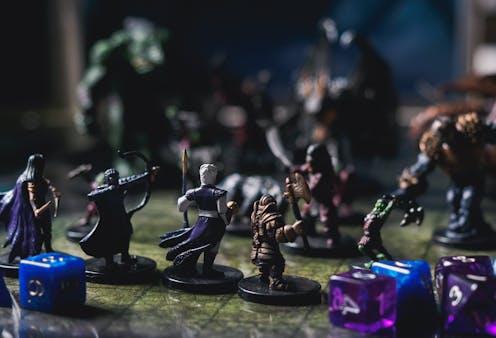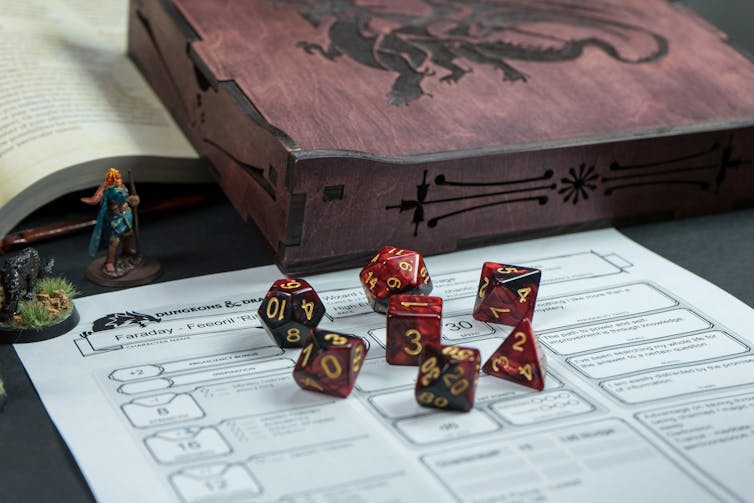
The tabletop role-playing game community took a keen interest in intellectual property law in January when changes to the Dungeons & Dragons Open Game License (OGL) were leaked.
The OGL is a public copyright licence that allows the general public — anyone from small companies to independent authors — to create content for Dungeons & Dragons under an approachable set of guidelines.
Traditionally, creating content for an existing game means negotiating finances, creative freedom and content distribution with the game’s owner. While commonplace, these negotiations take time and can be challenging for smaller creators who don’t have the administrative knowledge or corporate reputation to get a deal done.
In contrast, the OGL allows anyone to modify, copy and redistribute aspects of Dungeons & Dragons without gaining permission or paying licensing fees to Wizards of the Coast, the owner of the ubiquitous role-playing game.
These aspects are divided into two categories: game rules (such as combat mechanics) that can be used freely, and narrative elements (such as characters and settings) that remain off limits.
OGL-licensed works typically build upon Dungeons & Dragons’ rules and incorporate them into new settings, such as Paizo’s popular Pathfinder and Starfinder tabletop role-playing games.
With the latest changes to the OGL, third-party publishers and content creators have been trying to unpack how the latest iteration of OGL could affect their livelihood and leisure.
Why is the OGL making headlines?
OGL-licensed content is undoubtedly prevalent, popular and profitable.
Since 1999, there has been a wealth of content created under the OGL: companies like Paizo have built successful tabletop role-playing game franchises, major brands (Star Wars, Hellboy, Lord of the Rings) have adopted it for their own needs, and web series such as Critical Role have made millions streaming Dungeons & Dragons on Twitch.
So when a new version of the OGL leaked in January 2023, dubbed OGL 1.1, it was naturally met with some skepticism. Wizards of the Coast ostensibly designed the new licence to recognize emerging digital platforms, dissuade bigoted or toxic content, and, most controversially, to introduce anti-competitive measures.
In addition to putting into question the ownership of past and future products, these measures included:
- De-authorizing and replacing the original OGL
- Requiring OGL creators to register new products with Wizards of the Coast
- Mandating royalties for companies earning more than $750,000 yearly
- Removing perpetual rights, meaning OGL 1.1 could be changed down the line
These proposed changes were met with widespread opposition from players and businesses, many of whom felt its restrictive parameters would be unlawful, unfair or damaging to the hobby.
Fans campaigned to unsubscribe from D&D Beyond, Wizards of the Coast’s digital toolset, Paizo announced its own Open RPG Creative License, and news outlets reported that Wizards of the Coast staff condemned the company’s actions and their callous attitude toward Dungeons & Dragons players.
Following this sustained public pressure, Wizards of the Coast issued a public apology and reconfigured the licence to address criticisms.
The history of OGL
It may seem strange that Wizards of the Coast would renounce any control over Dungeons & Dragons, but the reasons behind this change are tied into the history of the game and informed by how tabletop role-playing games are structured.
While Dungeons & Dragons currently enjoys estimated yearly earnings of $100 to 150 million, the brand’s outlook has not always been bright.
In the late 1990s, Dungeons & Dragons was owned by American game publishing company TSR, which built up $30 million in debt due to low sales, an inflexible business structure and market oversaturation. At the brink of bankruptcy, TSR was acquired by Wizards of the Coast, which wasted no time in developing a new version of Dungeons & Dragons.
Much of this transition was orchestrated by Ryan Dancey, who managed TSR’s role-playing properties and envisioned the OGL as a way to make Dungeons & Dragons profitable once more. Inspired by the open-source software movement, Dancey felt the OGL would help establish Dungeons & Dragons as the default tabletop role-playing game.

Dancey hoped third-party publishers would take the risk of creating niche products for small audiences, allowing Wizards of the Coast to focus more on its profitable core products. These predictions were mostly proven true, as third-party publishers flourished and helped re-popularize the game.
The OGL was also a legal manoeuvre, as Dancey was aware that game rules typically don’t enjoy copyright protection in North America. For example, while many video games feature a jumping mechanic, no one can own the idea of jumping to navigate a level.
Legal troubles only arise if a game designer uses recognizable aspects of another game: say, a plumber in overalls leaping over green pipes. With the OGL, Wizards of the Coast drew a circle around aspects of Dungeons & Dragons it felt were protectable, while relinquishing its hold on the more ambiguous ones.
What’s next for the OGL?
The OGL controversy seems to be winding down, with Wizards of the Coast releasing Dungeons & Dragons’ core mechanics under a Creative Commons licence that, similar to OGL 1.0a, will allow creators to freely use game mechanics but not narratives, characters and settings.
Importantly, this new arrangement will not supplant or nullify the OGL 1.0a, which remains a key sticking point for companies that have built upon the licence for decades.
Still, the future of the OGL seems unsettled. Recent events have forced fans to reconcile their love of Dungeons & Dragons with the reality that Wizards of the Coast, which is owned by Hasbro, is a large corporation with commercial interests at heart.
While the rebuke of the new OGL was certainly a victory for publishers and creators, Dungeons & Dragons seems more precarious than it has been in years. What was once simply fun and games has turned into a shared struggle for ownership over the world’s most popular role-playing game.
Michael Iantorno does not work for, consult, own shares in or receive funding from any company or organisation that would benefit from this article, and has disclosed no relevant affiliations beyond their academic appointment.
This article was originally published on The Conversation. Read the original article.







